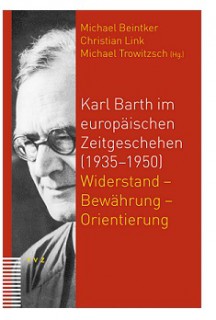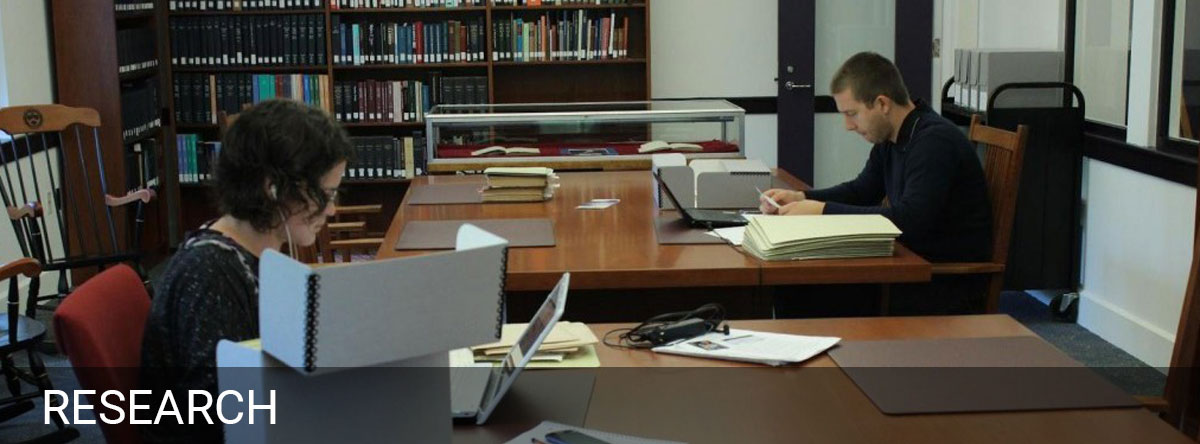 Beintker, Michael, Christian Link, and Michael Trowitzsch (eds.), Karl Barth im europäischen Zeitgeschehen (1935–1950), Widerstand – Bewährung – Orientierung. Beiträge zum Internationalen Symposion vom 1. bis 4. Mai 2008 in der Johannes a Lasco Bibliothek Emden (Zürich: Theologischer Verlag Zürich, 2010), 528pp. €54,00
Beintker, Michael, Christian Link, and Michael Trowitzsch (eds.), Karl Barth im europäischen Zeitgeschehen (1935–1950), Widerstand – Bewährung – Orientierung. Beiträge zum Internationalen Symposion vom 1. bis 4. Mai 2008 in der Johannes a Lasco Bibliothek Emden (Zürich: Theologischer Verlag Zürich, 2010), 528pp. €54,00
Reviewed by John G. Flett (July 12, 2012)
This nice collection, as the title suggests, constitutes the proceedings of the second “International Symposium on the Work of Karl Barth” held in 2008 (a similar volume—entitled Karl Barth in Deutschland (1921-1935)—was published after the 2003 symposium in Emden). It spans twenty-two essays, two discussions and one sermon, and is divided into four parts: plenary sessions, historical and biographical contexts, exegesis of Barth’s work history, and closing remarks. Though these divisions appear somewhat arbitrary in the printed version, more a legacy of its original conference format than an elucidation of the material, substantial work appears throughout. Apart from an essay from George Hunsinger, titled “Justification and Justice: Toward an Evangelical Social Ethic,” and the participation of Bruce McCormack in the discussion panels, this collection has a decidedly continental feel, with many of the contributors perhaps unknown in a North American context. But this difference in voice and the variety of subject matter adds to the benefit of the work. Indeed, it includes such rich material that it makes writing a review a difficult task: one simply cannot do justice to the whole.
Michael Weinrich leads off the first part, “plenary sessions,” with a introductory essay titled “The Theological Starting Points and Perspectives of Karl Barth’s Church Dogmatics: A Trinitarian Hermeneutic and the Determination of Theology’s Reach.” While it does not necessarily contain anything new, this chapter succeeds in delivering a clear and succinct summary of Barth’s founding questions—especially as they appear in the early volumes of the CD. It would be good to see this type of essay appear in English as a teaching tool. Also included in this section are essays by Jan Štefan on God’s Perfections in CD II/1, Bent Flemming Nielsen on the relationship of law and gospel in CD II/2, §§36–39, and Christian Link on Barth’s doctrine of creation. There is also an interesting piece by Henri Wijnandus de Knijff on Barth’s reception in Holland interpreted according to the contest between the “Gereformeerden” and “Hervormden” churches, where the former understood itself as separate from the wider society and charged with a specific task to that society while the latter understood itself in terms of its co-responsibility with society for socio-cultural questions.
Two highlights in this section are Wolf Krötke on “The Sum of the Gospel: Karl Barth’s Doctrine of Election in the Context of theChurch Dogmatics,” and Eberhard Busch on “Karl Barth in Current Events (Zeitgeschehen): ‘A Swiss Voice’ between 1935 and 1950.” Krötke traverses difficult ground with ease, providing a concise account of the significance and origins of the doctrine of election in Barth’s thinking, before giving seven snapshots of the implications of this position for his wider system, including (in point 7) the significance of being witnesses and heralds to the gospel. Krötke ends with a reflection on the significance of Barth’s doctrine of election for his earlier treatment of the Trinity, while addressing a complaint that Barth’s position permits an abstraction from above and a suggestion from von Balthasar that Barth had now drawn close to the analogia entis. One wishes that Krötke had expended more time on these latter issues, but his task seems to be more one of positive clarification than combative defense.
Eberhard Busch’s contribution differs from the more doctrinal pieces within the section in that it examines Barth’s political protest against Hitler and the reaction of the Swiss government. The data for his treatment comes from the “Schweizer Bundesarchiv” in Bern, and the “Politischen Archiv des Auswärtigen Amtes der Bundesrepublik” in Berlin. It is a remarkable and complex story of censorship and of political pressure at the highest levels, with the Swiss government feeling that its neutrality might possibly be threatened through Barth’s actions. Included here is a consideration of how Barth understood the relationship between East and West toward the end of and after the Second World War, how this was perceived by political and even church authorities, and how it was reported in newspapers. The work is so arresting as to seem improbable if not for the impeccable reference work, and I look forward to seeing how it might inform those evaluating the political significance of Barth’s theological position.
Part two, on “historical and biographical contexts,” deals primarily with Barth’s “discussion partners.” Bonhoeffer (Ernst Feil) and Brunner after 1945 (Peter Zocher) both appear here, but so to does “refugee pastor” Paul Vogt (Henrich Rusterholz), publicist Arthur Frey (Frank Jehle), Dutch theologian Kornelis Heiko Miskotte (Hendrik Johan Adriaanse), and Confessing Church leader Hans Joachim Iwand (Gerard Cornelis den Hertog). In the case of Rusterholz’s treatment of Vogt, by way of example, the historical work is exemplary. Less evident, aside from personal support and encouragement, is how Barth’s work found expression in Vogt’s. Better here is den Hertog’s treatment of Iwand, especially in showing how Iwand himself navigated between the different theological authorities (notably Gogarten) of the period. One gains a more dialogical perspective as Iwand raised questions concerning Barth’s understanding of law and gospel and what he considered to be a too sharp negation of the state, one beyond that contained in the Barmen declaration.
Apart from these biographical snapshots, part two includes treatments of Barth on the guilt of the Germans (Michael Beintker), on the reorganization of the church in Germany after the Second World War (Martin Greshat), and on the East-West conflict (Sàndor Fazakas). To select but one, while the Barth material contained in the Fazakas piece may be familiar, the account of that material’s reception within Hungary and the type of questions it posed to both the local and global political order added a living quality to what can be something of an abstracted discussion between monolithic political systems.
Part three, “Exegesis of Barth’s Work History,” focuses more on doctrinal questions with the exception of one essay by Michael Trowitzsch on Barth’s interpretation of Martin Heidegger. Along with the aforementioned Hunsinger essay, Matthias Wüthrich writes on “nothiningness,” Christiani-Maria Bammel on anthropology, and Georg Plasger on ecumenical unity. Cornelis van der Kooi’s short but helpful piece on “Religion as Unbelief: Remarks on a Battle Cry (Kampfparole)” well sets the discussion within the limits of its context. After noting his impulse to address a heresy that sprung out of the church and found embodiment in the “German Christians,” van der Kooi outlines Barth’s position and the “inherent problematic of religion” as a human attempt at self-liberation and the manner in which local culture becomes determinative for this attempt. With this, for van der Kooi, it becomes clear that Barth is addressing the developments within Germany during the period. This conclusion is confirmed though five largely commonsense observations, the very simplicity of which may help move the discussion along.
Though it sometimes trends toward the hagiographical, this is a fine collection and—perhaps thanks to the framing of the conference—avoids becoming mired in methodological questions. Some of the historical research is outstanding, and the few “summary” type of essays in the volume succeed in presenting complex material in a clear and concise manner. If a complaint might be laid, it would concern the absence of any reference to a wider geographical reception of Barth during the same period. In some respects, the fine archival work functions as a type of historical recovery. That is, it perhaps calls into question some of the dismissive stereotypical slogans one commonly hears. It would have been interesting to address the interpretation of Barth’s thinking as it appeared in the English language world, and the way some of these treatments exert an ongoing influence. One might also have liked to see a treatment of Barth’s reception in Korea and Japan. These, however, are small quibbles that do not detract from this authoritative contribution to the field.
The views expressed here are strictly those of the author; they do not necessarily represent the views of the Center for Barth Studies or Princeton Theological Seminary.


